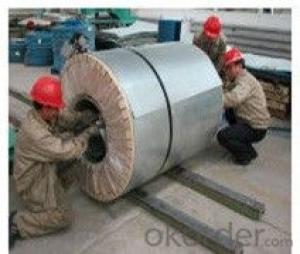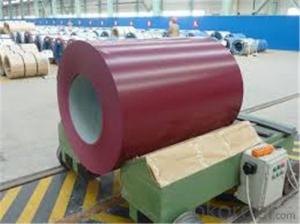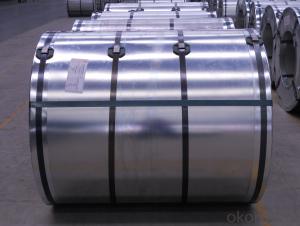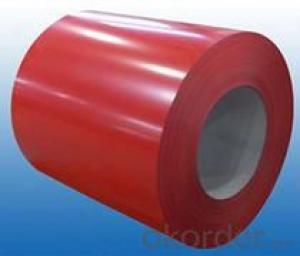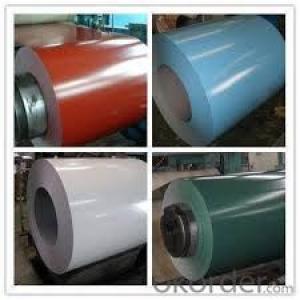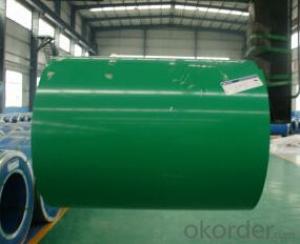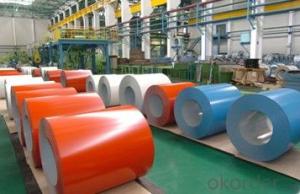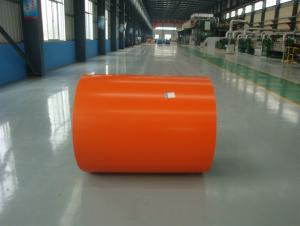Prepainted galvanized steel coil N
- Loading Port:
- China Main Port
- Payment Terms:
- TT OR LC
- Min Order Qty:
- -
- Supply Capability:
- -
OKorder Service Pledge
OKorder Financial Service
You Might Also Like
Product Name: PPGI ,PREPAINTED STEEL COIL,COLOR COATED STEEL COIL
* Base Material: Al-Zn Galvanized Steel Coil.//SGLCC
* Top side: 15-25 microns primer microns polyester.
* Back side: 5-8 microns primer epoxy.
* Width:700-,1250mm (The special width 914mm,1219mm,1220mm will be available )
* Thickness:0.17 -1.0mm Thickness tolerance: +/- 0.02mm
* Al-Zn coating: 30-150g /sq.m. or can be provided as clients' requirements
* Color: All RAL colour is available or customer supplying the sample
* Inner diameter of coil: 508mm&610mm.
* Packing: Standard seaworthy packing or according to user's need.
* Weight of each coil: 9 tons max
* Guarantee/ warranty
*Delivery time: Within 10-20 days.
- Q: How do the sandpaper grits compare with different coarse levels of steel wool? For example, I'm finishing a homemade entertainment center, and using a tinted polyurethane, and it says to use 000 grade steel wool, but mine is #3, could I use some sanpaper instead, and what grit?
- Steel wool and wax is for the final buff after the finish coat. Sanding will scratch the finish and should only be done before the finish coat. Steel wool and wax have been used as the final finish to remove rough areas and buff the finish for a long time.
- Q: I went to the store to get metal to make a knife and they had weldable steel and plate steel. Which one would be best/ which steels would be best for what i want to do?
- 'Plate' does not refer to a specific alloy. It simply describes the shape in which the metal is sold. Various steel alloys have varying degrees of weldability. Some weld well, with good strength. Others weld poorly, and crack or become very weak. Try looking up information on the specific alloy of steel.
- Q: What is the average shelf life of a painted steel coil?
- The average shelf life of a painted steel coil can vary depending on various factors such as the quality of paint used, environmental conditions, and storage practices. However, under normal conditions, the average shelf life of a painted steel coil is typically around 1 to 2 years.
- Q: steel structure
- Disadvantages Of Steel
- Q: I installed it, added it in F3 launcher and then after one minute of walking in wasteland I get a signal that Broken steel was added and that my level of caps was raised by 30. However after this message no quest is added. I played all 4 exp. packs and I had no problem at all, each time a new quest was added. So whats up with this Broken steel. Btw, I completed the entire game F3.
- Broken Steel's quests activate once you have beaten the final mission in the purifier. If you have already beaten the game, then you should just go back to the purifier and beat it again, since normally you wouldn't be able to continue to play the game once you have beaten it without Broken Steel. If you were able to continue playing the game, then it's likely that whatever mod you used is interacting with the game and making it impossible for Broken Steel to activate.
- Q: What are the dimensions of steel coils used in the furniture industry?
- The dimensions of steel coils used in the furniture industry can vary, but common sizes range from 0.5 to 3 millimeters in thickness and 100 to 2000 millimeters in width. The length can be customized based on specific furniture manufacturing requirements.
- Q: What are the common packaging defects in steel coils?
- Some common packaging defects in steel coils include improper wrapping, inadequate strapping or banding, loose or damaged packaging materials, moisture or water damage, and insufficient protection against impacts or abrasion.
- Q: the comparison needed between other steel
- *Mild steel is ductile and can be easily machined. Generation of heat is less than that of steel machining.So, the tool can have better life and you can do more machining. Cost factor is of prime importance as other steel are more costly than Mild steel. Mild steel, a grade of steel that does not harden when heated and chilled with cold water, so further machining can be easy. Mild steel is easily available.You will find it in your scrape yard. No need to change the tool repeatedly and no special tools are required for machining. Above is the comparisation between alloy steel,SS and superalloys. Cutting speed and feed does not required special skills.
- Q: I was wondering if steel cases can be loaded to the same pressure as brass cases. Are the cartridges that commonly feature steel cases like the Russian 5.45x39, 7.62x39 and 7.62x54R loaded to a lower pressure than their C.I.P. MAPs (380 MPa, 355 MPa, 390 MPa --gt; 51,488 psi to 56,564 psi)? There must be a reason why most NATO armies use brass cases...
- Steel cases are harder to manufacture, but cheaper in material. Loaded? Yes. Those cases are a very mild steel, and will 'flow' well enough to seal at the pressures involved. The question might come up with low pressure loads though. RE-loaded?? - I wouldn't try it, even if they weren't berdan primed.
- Q: I know that carbon steels and alloy steels are different but are carbon steels still alloys?Thanks!
- Carbon steels are alloys. This is evident in the carbon-iron phase diagram:
Send your message to us
Prepainted galvanized steel coil N
- Loading Port:
- China Main Port
- Payment Terms:
- TT OR LC
- Min Order Qty:
- -
- Supply Capability:
- -
OKorder Service Pledge
OKorder Financial Service
Similar products
Hot products
Hot Searches
Related keywords
